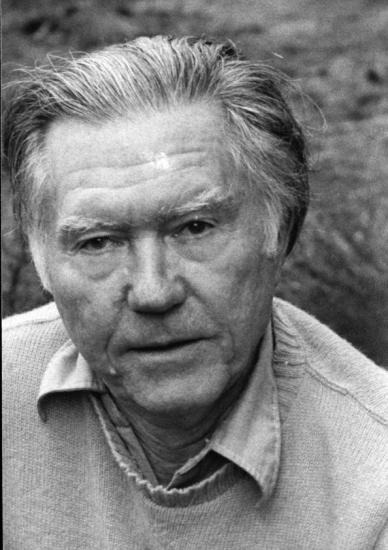 When William Stafford came upon this stanza in William Blake’s poem “Jerusalem”, his method of writing gained a process:
When William Stafford came upon this stanza in William Blake’s poem “Jerusalem”, his method of writing gained a process:
I give you the end of a golden string,/ Only wind it into a ball,/ It will lead you in at Heaven’s gate/ Built in Jerusalem’s wall.”
Stafford believed that “every thread” would lead writers, readers and the contemplative to an insight, often a profound one; an epiphany waited at the end of the thread; it might begin with “any impulse,”* any event, no matter how insignificant — a face turning to us in the crowd, a flat, hot sea, a coin pulled from the dust of the street. Pull on the thread. What memories float up from the warp and weft? What of their strange fragments might come together to tie a connection hard to our understanding?
I listened to a woman with dementia chant yesterday. She sat upright in her wheelchair behind my mother and I; a very thin nestling of a woman, eyes squinted almost shut, arms folded tightly over her chest; she leaned to her right, her knees bent together and pointed to her left. She recited again and again the same sentences:
Charlotte J******* doesn’t know anything about milk. I don’t know anything about milk either. My father knew about milk. I’m not going home. Let’s go home. Would somebody give me milk? Nobody gives me milk.
Then she would begin again — the same tone of voice, rhythm, pitch, volume, posture.
Later I thought of all the chants I have heard – from teasing delivered on the playground: “Joe and Mary sitting in a tree, k.i.s.s.i.n.g, first comes love, then comes marriage, then comes Mary with a baby carriage, ” to a more vicious kind of recurrent taunt: “Hey fish-eater … what kinds a fish-sticks is your mom makin’ for dinner.” Those lines delivered with adolescent venom ended in fights, graveled skin, bloody mouths.
I thought of the Latin Mass and the singing chant of the priest when he raised the Eucharist: “Accipite et manducate ex hoc omnes: hoc est enim Corpus meum, quod pro vobis tradetur,” and when he absolved us of our sins, his voice coming from a face we only dared glimpse at, its planes and angles glinting redly from the tiny light on his side of the confessional booth: “Et ego te absolvo a peccatis tuis in nomine Patris, et Filii, et Spiritus Sancti.”
We chanted the decades of the Rosary, the Our Father, the Hail Mary, and when vexed my mother would chant “Jesus, Mary and Joseph.” There must be a subterranean groove in our minds where we develop the inclination to speak in rhythm and repetition that exists independent of self-consciousness. Syllables create an equality of time and pacing. Even if the content is nonsense, the intonation can be pleasing to the ear: Jumbalo heehow hoho lo. As long as we can speak, we follow our rhythmic sounds. Perhaps they link us to our mother’s heartbeat, our origin point.
My mother is happy to eat today; she says little, but she smiles so gently when the doctor listens to her heartbeat. She does say thank you when the doctor tells her that her heart sounds strong. And she says thank you once more after I kiss her hand as I am standing to leave. All the way home I chant my own versions of thank you.
* from The Darkness Around Us Is Deep: Selected Poems of William Stafford
Mike, “Jesus, Mary and Joseph” made me laugh when I read it–and brought so many memories back! Not specific memories, but I can picture mom saying that with her hand on her forehead. I would love to hear her say it just one more time…….